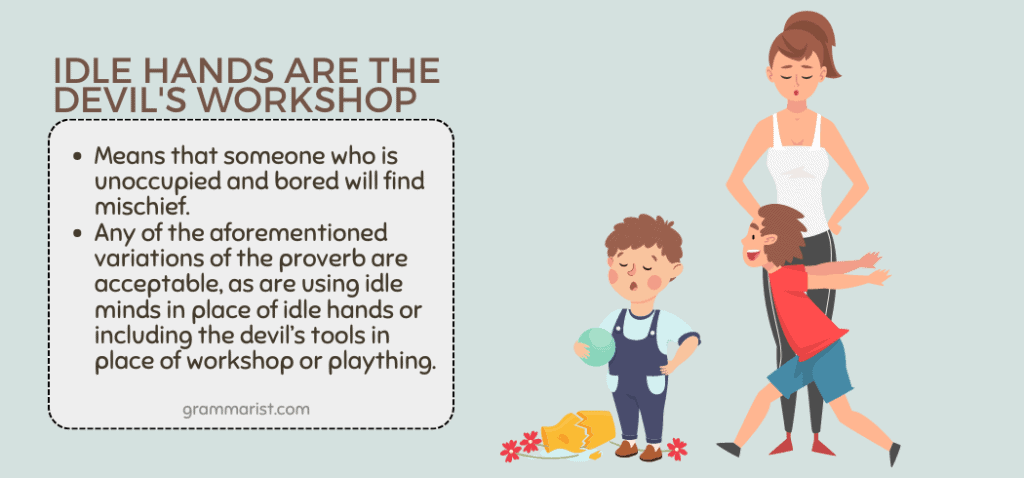At some point in your life, it’s been mentioned that keeping busy is better than being idle, lest you get into trouble.
This isn’t bad advice, and the proverb idle hands are the devil’s playground (or something similar) is rooted in Biblical scripture – making it an ancient suggestion indeed.
Proverbs add detail and description to the English language, helping you add meaning to your speech and writing. Let’s look at what this saying infers, where it comes from, and how you can use it.
What Does “Idle Hands Are the Devil’s Workshop” Mean?

The proverbs idle hands are the devil’s workshop, idle hands are the devil’s playthings, and idle hands are the devil’s playground mean that someone who is unoccupied and bored will find mischief. Or, someone who has nothing to do will partake in something that will get him into trouble.
This maxim is often quoted concerning children and teenagers who do not have responsibilities may find activities to take part in that are not constructive or do not meet with their parent’s or society’s approval.
What’s a Proverb?
A proverb is a saying that offers a perceived truth that is often used to provide advice. In this case, the proverb’s suggestion that idle hands or minds are the devil’s playground offers a warning that those who have too much time on their hands may fill that time with troubling behaviors.
It serves as a warning to those who may find themselves idle or slacking, as well as the caregivers and advisors of children and young adults who should provide opportunities for meaningful work lest they find other ways to fill their time.
Variations of the Saying
Any of the aforementioned variations of the proverb are acceptable, as are using idle minds in place of idle hands or including the devil’s tools in place of workshop or plaything.
Today, the version idle hands are the devil’s playground is by far the most popular; idle hands are the devil’s tools is the second most popular version, and idle hands are the devil’s workshop is the least popular version of the proverb.
As with many proverbs and idioms, often the first few words are quoted, idle hands, with the assumption that the reader or listener can supply the rest of the quotation for himself.
Where Did the Saying Idle Hands Are the Devil’s Playground Come From?
The origins of the saying are rooted in Biblical scripture. Although not a literal translation, the Apostle Paul offers in 2 Thessalonians 3:11 that those who are idle or not busy are easily led to sin. Proverbs 18:9 also explains that one who is lazy in their work is akin to one who destroys, and Proverbs 16:27 states, “An ungodly man diggeth up evil: and in his lips there is as a burning fire.”
The sentiments that laziness can lead to all kinds of evil behaviors have led to various insightful translations and studies. This includes St. Jerome’s writing in the late 4th century, “Engage in some occupation, so that the devil may always find you busy,” which is likely the source of the modern translation.
Chaucer also used the phrase in the Canterbury Tales, written in 1392, which likely gave rise to the saying’s popularity.
Using It in Sentences
- It’s no wonder those children got into the trouble they did; idle hands are the devil’s tools, and they were in need of structure and direction.
- The politicians lazing about led to a delay in House votes, proving the adage that idle hands are the devil’s playground.
- The cancellation of the after-school programming was a direct reason for the rise in student mischief in the community, as idle minds are the tools of the devil.
Let’s Review
Idle hands are the devil’s playground is a proverb influenced by biblical scripture stating that idleness leads to sin. The term came into popularity through the writings of St. Jerome and later Chaucer’s use of it in the Canterbury Tales.
It is used to describe how idleness or laziness can lead to poor decisions, is the root of mischief, and is usually applied to the behaviors of children and teens or adult layabouts who don’t have enough mental or physical stimulation.
